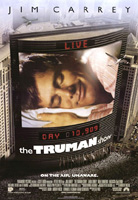 The Truman Show (1998) Having read the screenplay for The Truman Show about a year and a half before it came out, I harbored a lot of anticipation for this film and expected it to be the "next big thing." I would corner unsuspecting people at parties and in restrooms, hyping the film long before it was even being advertised. I became something of an Ancient Mariner about the whole thing. With a private hype machine like that, Truman was bound to disappoint me, which it did, although I can say honestly that it's a film of small brilliance and some real beauty. Certainly it had imperfections, but it had a smart and inspiring concept which it realized in full. Unlike similar feel-good film phenomenons such as Bubba Gump, Truman does not rely on pandering sentiment to make its points about humanity and society. It attempts to deal with real ideas, and it succeeds. The film's performances are winning, particularly Jim Carrey, finally showing some restraint. It's almost the performance everyone has wanted to believe he has in him, but which he has still not really delivered, since he started to make a total ass out of himself in that Ace Ventura horseshit. For my money, his '92 made-for-Fox-TV movie Doing Time On Maple Drive is still the best "serious Jim Carrey" moment … you have to give props to a Jim Carrey flick that can be shown on Lifetime. So no, Carrey's acting won't blow you away with its tenderness and range of expression. He's good, in a difficult part that fits his peculiar approach perfectly. Some of the more intense scenes seem to be shot around Carrey rather than on him, almost as if Weir is trying to dilute the hammy "emoting" (also on file in Man On the Moon), as during the climactic scene when Truman, sailing to what he thinks will be freedom, wails bitterly at the unfairness of his creator, his cries seen but not heard. That's either a statement about an apathetic God, or an attempt to downplay Carrey's scenery-chewing. The best performance of the film belongs to Ed Harris, as Truman's creator—he's oblique and intriguing, investing the egomaniacal TV producer cliché with a lot of truth. The story goes that Harris had only four days to prepare for the role, as he was brought on after Dennis Hopper quit/was terminated (not sure which, haven't talked to Hopper in a long time). He would've done a perfunctory job, but Harris really seems to shine. Truman has the kind of emotional gut-punch that knocks all the wind out of you, but it topples a bit in trying to resolve its central themes. It's a big movie, grappling with ideas about the media and our perception of "media events," and it can't seem to commit to either the satirical bite of a Wag the Dog or the life-affirming goodness of an Ikiru. Apparently quite a bit of material was trimmed to keep the running time down, and this is one case where a movie might have benefited from more length … much like my failed attempt to do porno. The Truman Show has elements of greatness, and even importance. In many ways it's a 70s movie for the 90s, blazing a trail rather than following one along, and challenging as it entertains. It's not feel-good claptrap nor riotous comedy. Solid, engaging, almost experimental filmmaking—an admirable, ambitious movie that tries, and mostly wins If you see only one movie this year, make it The Truman Show. But if you see two, make the other one House Party, because that movie is kickin'.
Review by James Buckles |